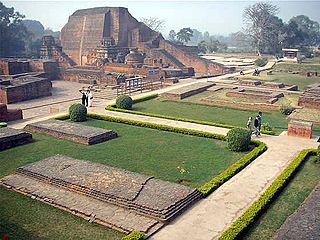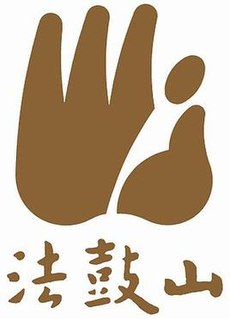Related Research Articles

Buddhist philosophy refers to the philosophical investigations and systems of inquiry that developed among various Buddhist schools in India following the parinirvana of the Buddha and later spread throughout Asia. The Buddhist path combines both philosophical reasoning and meditation. The Buddhist traditions present a multitude of Buddhist paths to liberation, and Buddhist thinkers in India and subsequently in East Asia have covered topics as varied as phenomenology, ethics, ontology, epistemology, logic and philosophy of time in their analysis of these paths.
Tibetan Buddhism is the form of Buddhism practiced in Tibet where it is the dominant religion. It is also found in the regions surrounding the Himalayas, much of Chinese Central Asia, the Southern Siberian regions such as Tuva, as well as Mongolia.

Tiantai is a school of Buddhism in China, Japan, Korea, and Vietnam that reveres the Lotus Sutra as the highest teaching in Buddhism. In Japan the school is known as Tendai, in Korea as Cheontae, and in Vietnam as Thiên thai.
Tendai is a Mahayana Buddhist school established in Japan in the year 806 by the monk named Saichō, posthumously known as Dengyō Daishi. The Tendai school rose to prominence during the Heian period (794-1185), gradually eclipsing the powerful Yogācāra school (Hossō-shū) and competing with the upcoming Shingon Buddhism to become the most influential at the Imperial court.

Korean Buddhism is distinguished from other forms of Buddhism by its attempt to resolve what it sees as inconsistencies in Mahayana Buddhism. Early Korean monks believed that the traditions they received from foreign countries were internally inconsistent. To address this, they developed a new holistic approach to Buddhism. This approach is characteristic of virtually all major Korean thinkers, and has resulted in a distinct variation of Buddhism, which is called Tongbulgyo, a form that sought to harmonize all disputes by Korean scholars. Korean Buddhist thinkers refined their predecessors' ideas into a distinct form.

Zhiyi is traditionally listed as the fourth patriarch, but is generally considered the founder of the Tiantai tradition of Buddhism in China. His standard title was Śramaṇa Zhiyi, linking him to the broad tradition of Indian asceticism. Zhiyi is famous for being the first in the history of Chinese Buddhism to elaborate a complete, critical and systematic classification of the Buddhist teachings. He is also regarded as the first major figure to make a significant break from the Indian tradition, to form an indigenous Chinese system.

Saichō was a Japanese Buddhist monk credited with founding the Tendai school of Buddhism based on the Chinese Tiantai school he was exposed to during his trip to Tang China beginning in 804. He founded the temple and headquarters of Tendai at Enryaku-ji on Mount Hiei near Kyoto. He is also said to have been the first to bring tea to Japan. After his death, he was awarded the posthumous title of Dengyō Daishi (伝教大師).

Fo Guang Shan Hsi Lai Temple is a mountain monastery in the northern Puente Hills, Hacienda Heights, Los Angeles County, California. The name "Hsi Lai" means Coming West

Buddhist meditation is the practice of meditation in Buddhism. The closest words for meditation in the classical languages of Buddhism are bhāvanā and jhāna/dhyāna.

Baizhang Huaihai (720–814) was a Chinese Zen master during the Tang Dynasty. He was a dharma heir of Mazu Daoyi. Baizhang's students included Huangbo, Linji and Puhua.

Shinnyo-en is a Japanese new religion in the tradition of the Daigo branch of Shingon Buddhism. It was founded in 1936 by Shinjō Itō, and his wife Tomoji in a suburb of metropolitan Tokyo, the city of Tachikawa, where its headquarters is still located.
Humanistic Buddhism is a modern philosophy practiced by new religious movements originating from Chinese Buddhism which places an emphasis on integrating Buddhist practices into everyday life and shifting the focus of ritual from the dead to the living.

Buddhism is the world's fourth-largest religion with over 520 million followers, or over 7% of the global population, known as Buddhists. Buddhism encompasses a variety of traditions, beliefs and spiritual practices largely based on original teachings attributed to the Buddha and resulting interpreted philosophies. It originated in ancient India as a Sramana tradition sometime between the 6th and 4th centuries BCE, spreading through much of Asia. Two major extant branches of Buddhism are generally recognized by scholars: Theravada and Mahayana.

Dharma Drum Mountain is an international Buddhist spiritual, cultural, and educational foundation founded by late Chan master Sheng-yen. The international headquarters of this organization is located at Jinshan District, New Taipei City, Taiwan.

Yifa is a Taiwanese scholar and writer and the founder of the organization, Woodenfish Foundation. She is a nun ordained in 1979 by Fo Guang Shan, a new religious movement of Taiwan. Yifa holds a law degree from the National Taiwan University, a masters in comparative philosophy from the University of Hawaii, and a doctorate in religious studies from Yale University. She served as a department head and dean of University of the West during her tenure at the college.

Ocean Sky Chan Monastery is the Manila, Philippine branch of Taiwan's Chung Tai Chan Monastery (中台禪寺). Completed in 2001, this temple offers free Zen meditation classes and other services, under the direction of Chung Tai and Grand Master Wei Chueh.

Chan, from Sanskrit dhyāna, is a Chinese school of Mahāyāna Buddhism. It developed in China from the 6th century CE onwards, becoming dominant during the Tang and Song dynasties. After the Yuan, Chan more or less fused with Pure Land Buddhism.
Changlu Zongze was a Chinese Chan Buddhist monk noted for writing the Chanyuan Qinggui, or The Rules of Purity in the Chan Monastery. Written in 1103, it was the earliest comprehensive book of monastic rules for Chan Buddhist monasteries. The short essay Zuochan yi, also attributed to Zongze, is the earliest guide to seated meditation in the Chan tradition.
Robert Evans Buswell Jr. is an American academic, author and scholar of Korean Buddhism and Chinese Buddhism as well as Korean religions in general. He is Professor of Buddhist Studies at the University of California, Los Angeles and founding director of the Academy of Buddhist Studies at Dongguk University, Korea's main Buddhist university.

Nanyue Huisi, was an eminent Chinese Buddhist monk, traditionally regarded as the third patriarch of the Tiantai school. According to Sasaki, Huisi "was the leading authority on the Lotus Sutra of his time."
References
- ↑ "About us". The Woodenfish Foundation. The Woodenfish Foundation. Retrieved 22 September 2017.
- ↑ "Woodenfish Gains Special Consultative Status with United Nations' ECOSOC". Woodenfish website blog. Retrieved 22 September 2017.